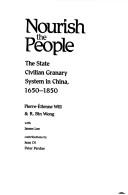| Listing 1 - 4 of 4 |
Sort by
|
Book
ISBN: 9781782549192 Year: 2014 Publisher: Cheltenham Edward Elgar
Abstract | Keywords | Export | Availability | Bookmark
 Loading...
Loading...Choose an application
- Reference Manager
- EndNote
- RefWorks (Direct export to RefWorks)
Food consumption --- Food supply --- S10/0585 --- S20/0315 --- S20/0310 --- China: Economics, industry and commerce--Marketing (including consumption) --- China: Agriculture forestry, fishery, natural disasters--Rice and wheat: after 1949 --- China: Agriculture forestry, fishery, natural disasters--Rice and wheat: general and before 1949
Book
ISBN: 0631169431 0631148779 9780631148777 9780631169437 Year: 1989 Publisher: Oxford Blackwell
Abstract | Keywords | Export | Availability | Bookmark
 Loading...
Loading...Choose an application
- Reference Manager
- EndNote
- RefWorks (Direct export to RefWorks)
330.342 --- 330.342 Economische ontwikkeling. Groeistadia --- Economische ontwikkeling. Groeistadia --- S20/0310 --- S20/0315 --- S20/0260 --- S10/0200 --- J4431 --- -Rice trade --- -Rice industry --- China: Agriculture forestry, fishery, natural disasters--Rice and wheat: general and before 1949 --- China: Agriculture forestry, fishery, natural disasters--Rice and wheat: after 1949 --- China: Agriculture forestry, fishery, natural disasters--Peasant economy --- China: Economics, industry and commerce--General works and economic history: general --- Japan: Economy and industry -- agriculture -- rice --- -Agronomy --- -China: Agriculture forestry, fishery, natural disasters--Rice and wheat: general and before 1949 --- -S20/0310 --- Agronomy --- Asia --- Agriculture --- Rice trade --- S20/0280 --- Rice industry --- Grain trade --- Economic aspects --- China: Agriculture forestry, fishery, natural disasters--Rural economic development --- Economic conditions --- Riz --- Commerce --- Aspect économique --- Asie --- Conditions économiques --- Rice trade - Asia --- Asia - Economic conditions - 1945 --- -Agriculture

ISBN: 9780892640911 9780892640904 089264091X 0892640901 0472127861 0472901826 Year: 1991 Publisher: Ann Arbor, Michigan : University of Michigan Press,
Abstract | Keywords | Export | Availability | Bookmark
 Loading...
Loading...Choose an application
- Reference Manager
- EndNote
- RefWorks (Direct export to RefWorks)
Grain trade --- Granaries --- Food supply --- Agriculture and state --- Céréales --- Greniers (Entrepôts) --- Aliments --- Politique agricole --- Government policy --- History. --- Commerce --- Politique gouvernementale --- Histoire --- Approvisionnement --- S20/0310 --- S10/0210 --- China: Agriculture forestry, fishery, natural disasters--Rice and wheat: general and before 1949 --- China: Economics, industry and commerce--General works and economic history: before 1840 --- Céréales --- Greniers (Entrepôts) --- Grain bins --- Graineries --- Grain --- Storage facilities --- Produce trade --- Food control --- Agriculture --- Food security --- Single cell proteins --- Agrarian question --- Agricultural policy --- State and agriculture --- Economic policy --- Land reform --- History --- Government policy&delete& --- Storage --- History of Asia --- anno 1600-1699 --- anno 1700-1799 --- anno 1800-1899 --- China
Book
ISBN: 9781402091803 9781402091797 Year: 2010 Publisher: Dordrecht Springer Netherlands
Abstract | Keywords | Export | Availability | Bookmark
 Loading...
Loading...Choose an application
- Reference Manager
- EndNote
- RefWorks (Direct export to RefWorks)
With 22 percent of the world's population but only 7 percent of its arable land, China's food situation is a matter of global concern. Environmental Change and Food Security in China, is the first to introduce comprehensively the threats to China's system of food production, distribution, and consumption. It analyzes broad challenges of population growth, urbanization, and extraordinarily rapid economic development. Then it focuses on degradation of China's land, water and air, water sufficiency, and evidence of climate change effects as they adversely affect the food system. The study investigates plant diseases and pests which take a large toll on agricultural production and also considers alien invasive species. Normal bureaucratic routines of agricultural, land, water, climatological, and environmental agencies are inadequate to counter these challenges, and the regime has launched large projects (e.g., the South-North Water Diversion Project) and conducted national campaigns (e.g., re- and afforestation programs) which are unprecedented in their scope. Also, China has invested more heavily in agricultural biotechnology research than any other developing country. These responses have insured self-sufficiency in food staples to the present. The volume evaluates several future problems and issues in China's approach to food security. Despite attempts to tighten coordination of policy and improve enforcement, as seen in efforts to resolve the tainted products crisis of 2007, the increased autonomy of local governments often frustrates green and clean ambitions of the state. Although the regime has tolerated environmental and other NGOs, allowed the media greater latitude to report bad news, and permitted protests that do not challenge the communist party's authority, still civil society is weak. While economic development has lifted more than 200 million from poverty, rural/urban inequality increases, pushing the poor into China's cities, and access to food remains a problem for many.
Life Sciences. --- Agriculture. --- Political Science. --- Plant Pathology. --- Environmental Law/Policy/Ecojustice. --- Food Science. --- Climate Change. --- Life sciences. --- Food science. --- Plant diseases. --- Climatic changes. --- Environmental law. --- Political science. --- Sciences de la vie --- Agriculture --- Plantes --- Climat --- Environnement --- Science politique --- Maladies et fléaux --- Changements --- Droit --- S20/0315 --- S20/0310 --- S20/0500 --- S20/0253 --- S21/0600 --- China: Agriculture forestry, fishery, natural disasters--Rice and wheat: after 1949 --- China: Agriculture forestry, fishery, natural disasters--Rice and wheat: general and before 1949 --- China: Agriculture forestry, fishery, natural disasters--Environmental policy, pollution --- China: Agriculture forestry, fishery, natural disasters--General works: since 1979 --- China: Medicine, public health and food--Chinese food and cookery, (incl. tea) --- Agricultural innovations --- Food crops --- Food supply --- Food --- Plants, Edible --- Field crops --- Horticultural crops --- Effect of global warming on --- Effect of pollution on --- Government policy
| Listing 1 - 4 of 4 |
Sort by
|

 Search
Search Feedback
Feedback About UniCat
About UniCat  Help
Help News
News